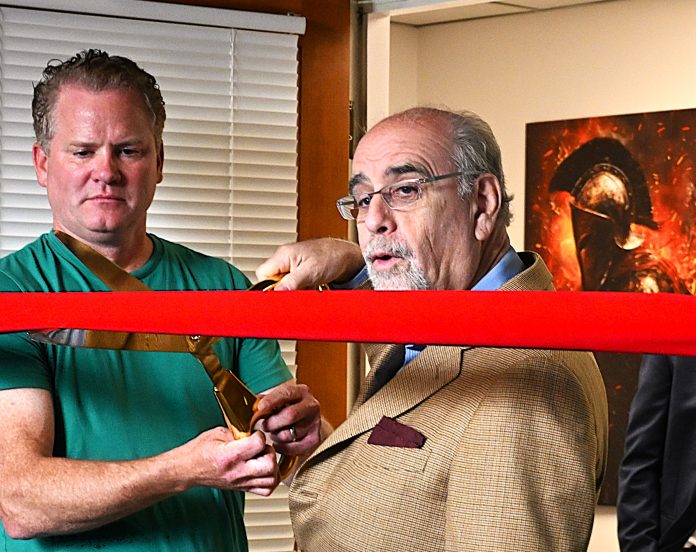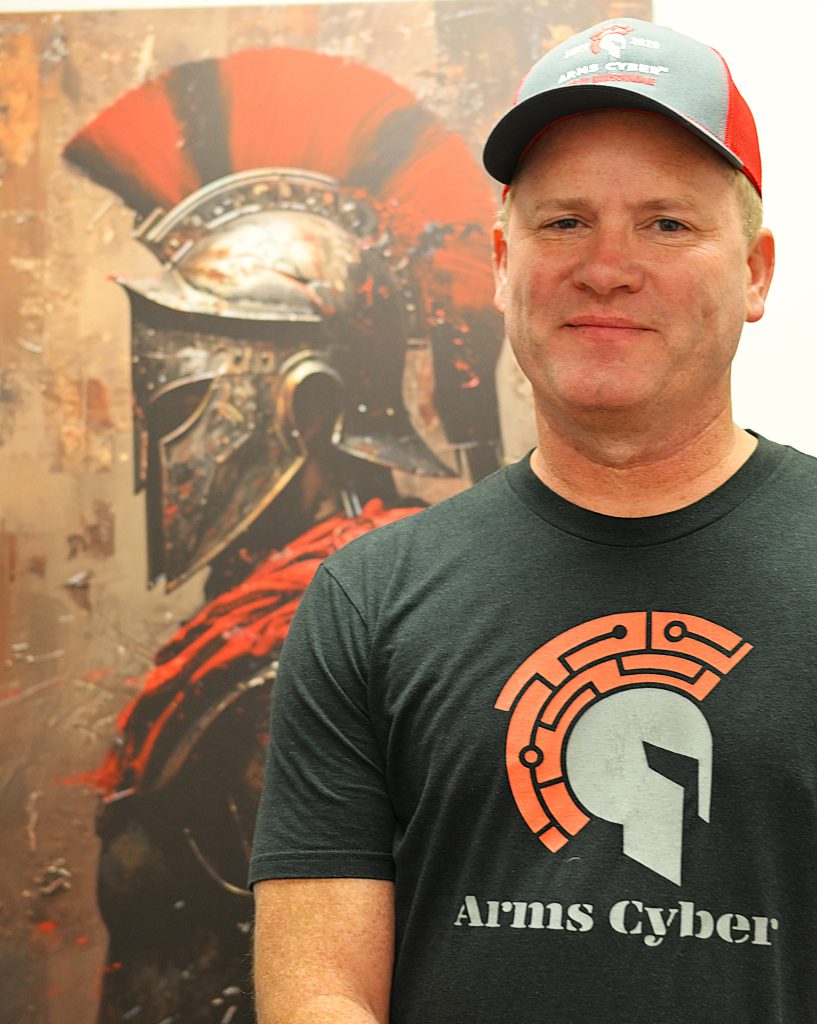
On Monday, Oct. 20, along with the assistance of the Los Gatos Chamber of Commerce and our mayor, Arms Cyber Defense, Inc. held their ribbon-cutting ceremony at their new international headquarters.
From the Los Gatan’s observations, Mayor Matthew Hudes is getting quite good at operating the giant scissors at these events, with the support and encouragement of Chamber Executive Director Jennifer Lin and her team.
Mayor Hudes will be the go-to ribbon-cutter until Dec. 9, when Vice Mayor Rob Moore is set to take over mayoral duties (his invitations have already gone out).
“Better to think about cyber security before you are hacked than after,” said Arms Cyber Defense CEO Bob Kurse. “It is easier to install cyber defense prior to being hacked than during, or after.”
This cyber ransom attack or “software ransoming” usually means ransomware.
This is the malware that encrypts or steals data and then someone demands payment in exchange for its return—or nondisclosure of personal information.
Ransomware will remotely hold control of all of the software’s abilities.
Publicly held companies must now disclose if they have been ransomed.
Have you received notices stating that your social security number or other private details have been acquired by third parties?
Ransomware fears
A ransomware-malware victim can lose access to all their data in a second.
Any and all transactions that were processed on it suddenly become frozen.
Remotely controlled, a ransom is set.

If a ransom fee is paid, the victim still might just get a small portion of software access back.
And even then, the perpetrators may ask the victim to fork over even more cash.
“If you pay the ransom, then you’re just basically opening up the floodgates to pay more ransom,” Kruse said. “In the UK, it is illegal to pay ransom.”
He continued, “Publicly traded companies now need to disclose that hacking has occurred.”
Ransomware remains a major threat to organisations of all sizes.
Currently, Arms is offering to do a demo for interested parties.
“It is not a question (of), Will I be attacked?, it is, When you will be attacked.”
Hospitals are not immune to cybercrime
Kurse went on explaining how these profit driven “hackers” have no concern about holding health systems ransom.
“They’ll take down a hospital, hold the software ransom so that the hospital…can not care for its patients or staff members—and supply services—until the ransom has been paid,” he said. “If you can imagine that, then understand that this is extortion.”
In a case like this, a cyberattack could be life-threatening, he said.
“And it does not stop,” he said.
Criminals target everyone
Once you notice that your software is unusable, you may receive information through normal channels—such as text, email or phone calls—informing you that you have been hacked.
These ransom attackers even have customer service staff that will help you pay the ransom and unlock your system.
It’s crime on a global scale.
Anybody who uses software is a potential victim. Anyone with valuable data (from the government, to clinics, to large facility operators) can be a target.
Attackers tend to go where the payoff is huge and leverage is available, where the opportunity to hack is best and the hacking is the easiest.
Hackers “follow the money.” Celebrities and high-net-worth individuals can be in the crosshairs.
But also mom-and-pop and medium-sized businesses can be victims.
And a range of industries (think finance, tech, energy, logistics, healthcare, transportation, water provision, food supply, emergency services, government, law enforcement, military, education, healthcare and universities) can be vulnerable.
This ransom scenario is the biggest worry for large concerns, however, no one is too small, or too obscure, to avoid interest from these nefarious digital actors.
Just think about when you got your last scam call, email or text?
Now, with the aid of artificial intelligence, even your voice and image can be used to do what might help in obtaining ransom.
“AI is increasing the need for security,” Kruse said. “What might take a month to code, AI can do in days.”
In other words, AI makes ransoming easier.
He also added, “The most dangerous part of the computer is the person using it.”
So, stay aware.
It’s enough to make you wonder about picking up some anti-ransomware insurance.
Are you being hacked?
Early detection can stop hackers in their tracks.
Or better yet, protect yourself ahead of time with a cyber defense system, says Kurse.
You can also be vigilant for warning signs of inappropriate activity.
For example, if new, or unusual, file extensions appear on many files. If you’re alerted to many failed log-in attempts, or if you detect suspicious outbound traffic of large uploads to an unknown IP address, you may be under attack.
If so, ransom notes may soon begin appearing on your desktop or other devices.
Forewarned is forearmed
There’s a famous proverb, “Prior knowledge of possible dangers or problems gives a tactical advantage.”
Basically, if you know about a danger area in advance, you can be prepared to deal with it.
So, be aware of cyber risks, and set up a defense plan—and possibly defense software—before anything bad happens, urges Kruse.
After all, experts say that these attacks are becoming more common.
In closing, Kruse shared the following tips for staying safe on your computer:
- Awareness – Keep it at a high level.
- Vigilance – Keep your system updated.
- Multi-layered – Use two-factor identification.
- Fortify – Keep your passwords strong.









